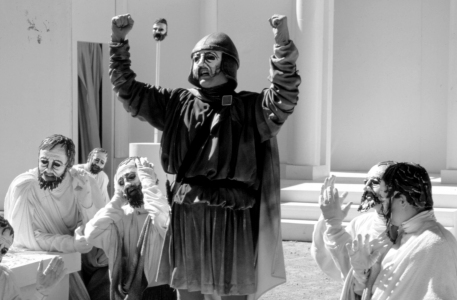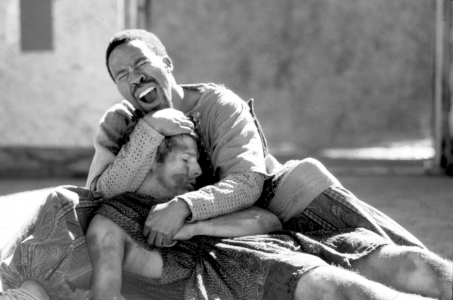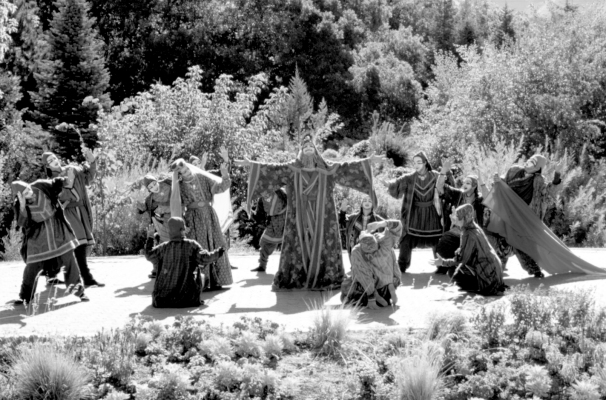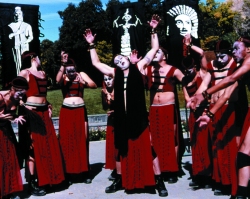
VOL.10 NO. 2 THE MAGAZINE OF THE UNIVERSITY OF UTAH FALL 2000
The
Gods Must
Be Crazy
by Mary Dickson
 |
|
"Oedipus Rex" (1990) at Pioneer Trail State Park, directed by Tom Markus, with Willard Knox as Oedipus. Photo by Jay Borowczyk |
The Classical Greek Theatre Festival celebrates 30 years of tragedy
Dionysus was clearly not happy.
The Greek god of wine didn't appreciate a group of students mounting a
production of Aristophanes' The Frogs that mocked him, and his
vengeance was swift. Cast members came down with mysterious illnesses.
One ended up in a wheelchair and was ill for six months. Another simply
disappeared, dropping out of school never to be heard from again. The
cast of 12 shrank to a cast of eight. Then the stage manager took a 15-foot
fall into the orchestra pit and broke her ankle. On a sunny September
day marked by perfect temperatures, a huge storm suddenly blew in, tearing
down the backdrop and tossing it to the winds. When it began to snow,
the production had to be canceled.
"You can't fool around
with Dionysus or things go wrong," smiles Jim Svendsen, who for 30
years has been bringing Greek theater to Utah audiences. The Frogs' episode
is one of Svendsen's favorite anecdotes from three decades of mounting
the outdoor Classical Greek Theatre Festival (CGTF) under the auspices
of the University of Utah Department of Theatre.
The animated Svendsen, whose passion for the traditions of Greek theater
is infectious, loves telling stories about the Greek Theatre Festival.
For most of its history, the program has held the distinction of being
the only festival of its kind in the country. "We're still the only
ones who do Greek tragedy as it was intended, with a chorus," he
says.
"It's hard to argue with
momentum and longevity," says David Dynak, chairman of the theatre
department. "The commitment it has engendered from so many people
is impressive, particularly from Jim as dramaturge, lecturer, tourer,
producer. He's really been the paterfamilias of this."
The program had its beginnings in 1971 in the green room of Pioneer Memorial
Theatre when Svendsen was playing Merlin in Camelot. "We did 42 shows,
and Merlin dies off early on, so I had a lot of time on my hands to think
and imagine," he recalls. He would sit in the green room talking
with Keith Engar, then artistic director of Pioneer Theatre and chair
of the theatre department. The two men noticed that there were a couple
of Shakespeare festivals but that no one did Greek theater. They hatched
a plan to stage a Greek play on campus. They had no idea if they could
attract an audience at six o'clock in the morning in the middle of the
summer to see Steve Coleman portray Prometheus in Aeschylus' Prometheus
Bound. But more than 300 people braved the dawn, and the University's
Classical Greek Theatre Festival was born.
 |
| Alfred Lawrence Smith (top) as Theseus and Jay Perry as Hippolytus in 1997's "Hippolytus" at Red Butte Garden & Arboretum, directed by Sandra Shotwell. Photo by Jay Borowczyk |
Svendsen has remained committed to producing conventional Greek theater in the ancient Athenian tradition. Formal dramatic productions in Athens originated as competitions associated with public festivals dedicated to Dionysus. Each spring, Athenian citizens (only men were considered citizens) celebrated the "city Dionysia" by performing in plays held in the enormous theater of Dionysus.
Three masked actors performed
all roles, with a singing and dancing chorus of 12 or 15 people. An essential
element of all Greek tragedy, the chorus performed a variety of functions,
from advancing the action to offering sympathy to announcing opposition
and doom. The productions used little scenery. Plays were performed at
sunrise when citizens were thought to be most alert and most receptive
to learning the play's lessons.
That's precisely why Svendsen stages productions outdoors at dawn. "It's dark and mysterious, which suits the Greek plays," he says, pointing out that audiences have started their own tradition of bringing breakfast and sometimes sleeping bags. In the festival's second year, Pioneer Theatre favorite Max Robinson, in keeping with Athenian tradition, played three roles under three different aliases, wearing three different masks, in Philoctetes. No one discovered that he played all the parts.
Since its inception, the University's Classical Greek Theatre Festival has staged 30 productions, remaining true to the spirit of ancient Greece. The festival has brought such works as Orestes, The Bakkhai, Medea, The Persians, Iphigenia in Tauris, Oedipus the King, The Trojan Women, Prometheus Bound, Electra, and many more to audiences in Utah and beyond. Over the years, the festival not only has toured the state from Logan to Montezuma Creek as part of the Utah Performing Arts Tour, it has also taken productions to Santa Fe and Albuquerque, New Mexico; to Santa Clara and Santa Cruz, California; and to Durango, Colorado. The most recent requests have come from the former Getty Museum in Malibu and from Las Vegas. Both venues want productions for new amphitheaters they are building. But Svendsen's real dream is to take a production to Greece.
 |
| "The Persians" (1993) at Red Butte Garden & Arboretum, directed by Sandra Shotwell. Photo by Jay Borowczyk |
About 10 years ago, the festival became part of the University's Babcock Theatre, opening the theatre's season the last week of September and first week of October. A Greek tragedy has been the opening production of the season ever since. Though the productions take place in the fall, they continue to be performed in the early morning. The first productions were staged on the steps north of the Marriott Library. Two productions were mounted on the front steps of the Park Building, which provided a nice illusion of a Greek facade. Tony Larimer and Gail Hickman performed a production of Medea on the Park Building steps that is still praised by those who saw it.
 |
| Trudy Jorgensen (l.) as Helen, Jon Seaman (C.) as Nenelaus, and Holly Claspill (R.) as Theonoe in 1989's "Helen" at Pioneer State Trail Park, directed by L.L. West. Photo by Robert Clayton |
When audiences grew too large, the festival moved east of This is the Place Monument, where a herd of deer often joined rehearsals. After the sets were twice vandalized, the productions moved to Red Butte Garden. Though security was good, acoustics were problematic and the seating had early-morning audiences looking directly into the rising sun.
Outdoor theater has its obvious challenges. "It's both wonderful and horrific," says Svendsen. "You have no control over audience, set, or weather, which can play cruel tricks on actors and productions. It's risky business. But the unexpected makes for good drama."
There was the time, for instance,
when the sprinklers came on at Red Butte just before performance time,
providing the audience with some soggy seating. Or the time when a drunk
man at Pioneer Park tried to rescue Antigone from the stage. Or the uncooperative
weather during a performance of Agamemnon. In the play, the gods
have arranged for the winds not to blow. Agamemnon sacrifices his daughter
so that the winds will be stirred for the trip to Troy. "The actors
are talking about this lull in the weather, how there is no wind, and
we're in Red Butte with a 40-mile-per-hour wind coming down the canyon
and blowing the sets," says Svendsen.
In 1980, director David Jones'
production of Hippolytus was plagued by rain and unseasonably cold
weather. Everyone got sick, which actually ended up working to one scene's
advantage. In the play, Phaedra falls in love with her stepson, Hippolytus.
As her will to resist him weakens, the actress playing the goddess Aphrodite
fainted and fell to the ground. "She's talking about being sick in
love, then she falls down. Everyone thought it was a great touch that
she just dropped to the ground," recalls Svendsen. "We were
thinking, how did David Jones think of that? We all gasped at his blocking
and artistic conception. The truth was she had fainted."
In 1983, when Kenneth Washington's
production of Antigone toured southern Utah, the O.C. Tanner amphitheater
outside Zion National Park provided a breathtaking site for Greek tragedy,
with an unparalleled backdrop of red rock against a blue sky. Even more
awe-inspiring, however, was the hawk that stalked Michelle Peterson as
she played the role of Antigone. "When Antigone entered the stage,
the hawk appeared; whenever she exited offstage, the hawk disappeared;
and when she disappeared to her death, the hawk, too, disappeared and
was not seen again," recalls Svendsen. "It was nothing you could
control, but it was magic. It was like the hawk knew his blocking, his
cues and entrances. It tied in perfectly with the bird imagery in the
play."
If the impromptu cast member
in Springdale was magic, disaster awaited in Montezuma Creek on the next
stop of the tour. At the Navajo Reservation there, students had been primed
on what they would be watching. Everyone had made masks and couldn't wait
to see the show.
"We brought absolutely
the wrong show," says Svendsen. "Antigone is about a
young woman who would die in order for her brother's corpse to obtain
proper burial. Since the Navajo way of death differs so radically from
the ancient Greek custom, it proved to be a real problem in performance.
In Navajo culture it's taboo. Not only that, but who's telling [the other
characters] what to do? A teenage girl. All the boys in the audience laughed.
It was a cultural misfit. None of us had thought of it."
 |
| "The Libation Bearers" (1999) at Red Butte Garden & Arboretum, directed by Helen Richardson. Photo by Carl Kunz |
As the producer, Svendsen
selects a new director each year to keep productions fresh. Directors
come largely from the theatre department. "There is no one vision
of how to do Greek theater," he says. "Each director can do
what he or she wants with a production. Some are more traditional; others
bring in Venice Beach biker gangs. My job is to get a mix so that it's
not all modern riff or all long skirts and masks." Helen Richardson,
for instance, took a novel approach to last year's The Libation Bearers,
setting the tale of Orestes avenging his father's death by killing his
mother and her lover as a Venice Beach biker gang piece with ritualized
violence. The production was a finalist in the Kennedy Center's American
College Theatre Festival, where it received the award for best ensemble.
Other directors have taken an African storytelling approach. Adrian Giurgea's
benighted Frogs was a mix of Aristophanes, Fellini, and the Ringling Brothers.
"I'm just a matchmaker," says Svendsen. "I try to match
the script to a director."
Casts come from the theatre department's actor-training program, although directors will cast outside actors for special roles, giving students the experience of working with local professionals. But most important is the experience of performing what Svendsen calls "the monumental, gut-wrenching, overwhelming emotions of Greek tragedy." Adds theatre department chair David Dynak, "Usually we only read Greek tragedy. The opportunity to see it and perform in it is quite special. These performances are important to our academic mission."
|
To commemorate the festival's 30th anniversary, the "Ion" production will be performed at the festival's original site, the Rock Plaza, just north of the Marriott Library, on two weekends, September 23-24 and September 30 and October 1. |
Though held in outdoor venues with minimal sets, the productions cost
an average of $50,000 each to produce. The program is funded through ticket
sales ($5 for students, $10 for adults). Touring generates a flat fee
from each venue. The annual production is allotted $4,000 for sets and
costumes through the theatre department, the same amount given to each
Babcock show. The program also receives grants from the Salt Lake Arts
Council, the Utah Arts Council, Utah Performing Arts Tours, the Greek
Orthodox Church, and the Zoo, Arts and Parks tax. Generous private donors
make up the difference. Longtime supporter Ellen Furgis threw a fund-raiser
in her backyard overlooking the zoo. Actors performed Medea against
a backdrop of inquisitive ostriches, elephants, and big cats. "People
still talk about the dinner that came complete with an animal chorus,"
says Svendsen. "There was a real sense of celebration."
Thirty years of classical
Greek theater is cause for celebration. Dynak is inviting those who acted
in the last 30 productions to return as the chorus for a special performance
of Euripides' Ion that he will direct this fall. The play, which has been
likened to a Greek Importance of Being Earnest, is more comedy
than tragedy. "No one dies and there are no murders or incest, though
the gods muck around in human affairs as they are wont to do," says
Dynak, who promises a "hip-hop feel with Gucci dress and a little
androgyny."
To commemorate the festival's 30th anniversary, the Ion production will be performed at the festival's original site, the Rock Plaza, just north of the Marriott Library, on two weekends, September 23-24 and September 30 and October 1. After the show on Sunday, September 24, a special buffet lunch will honor Svendsen, who is retiring from the festival. Past festival participants and the audience will be invited to participate in the final choral ode. Just as long as no one makes fun of Dionysus, everything should be smooth sailing for Svendsen's send-off.
—Mary Dickson is director of creative services at KUED-Channel 7.
Continuum Home Page - University of Utah Home Page - Alumni Association Home Page
Questions, Comments - Table of Contents
Copyright 2000 by The University of Utah Alumni Association